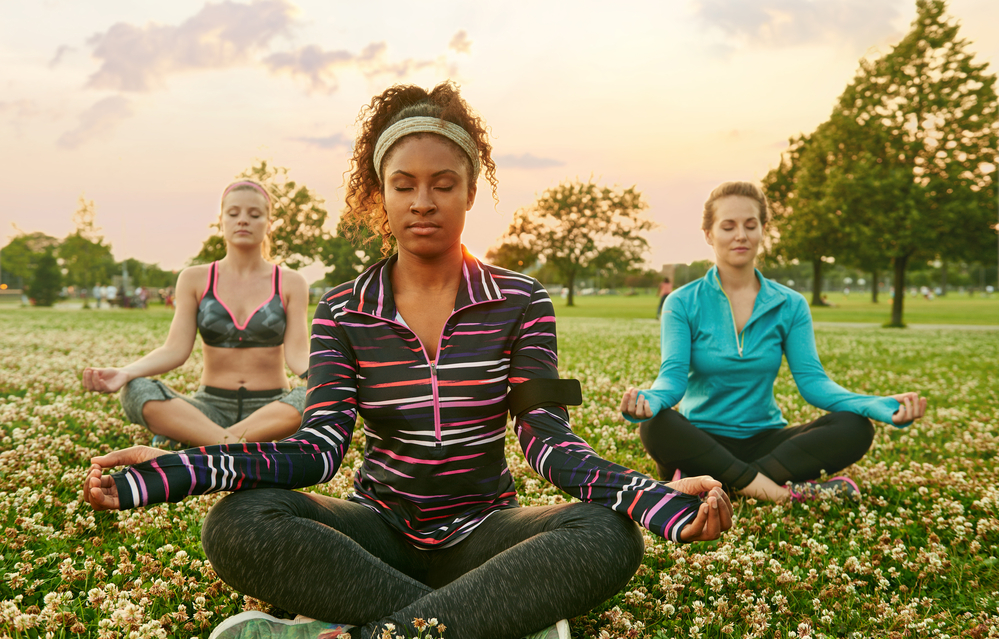In today’s fast-paced world, stress has become an all-too-common companion for many people. But what if there were proven strategies to help you reclaim your sense of calm and well-being? Get ready to discover a range of effective stress relief techniques that can transform your life.
Are you ready to embark on a journey towards a more relaxed and balanced lifestyle? By incorporating these stress-reducing practices into your daily routine, you can unlock the key to a happier, healthier, and more fulfilling life.

Key Takeaways
- Explore the profound impact of stress on your physical and mental health.
- Learn effective stress management techniques, from physical activity to mindfulness practices.
- Discover the power of a balanced diet and positive self-talk in reducing stress levels.
- Understand the importance of building a supportive social network and engaging in leisure activities.
- Discover how the ancient practice of yoga can harmonize your body, mind, and spirit.
Stress and Your Health: Understanding the Impact
Stress can significantly affect both our mental and physical health. If not managed, chronic stress can cause symptoms like fatigue, irritability, and difficulty concentrating. It can also lead to physical issues such as headaches, muscle tension, and digestive problems.
Recognizing the Signs of Chronic Stress
Identifying chronic stress symptoms is crucial for addressing its health effects. Common signs include:
- Persistent headaches and muscle tension
- Digestive problems such as nausea, stomach pain, or diarrhea
- Feeling overwhelmed, irritable, or anxious
- Difficulty sleeping or sleeping too much
- Weakened immune system and frequent illnesses
The Negative Effects of Prolonged Stress
Chronic stress can severely impact our health. Research indicates that it increases the risk of various health issues, such as:
- Cardiovascular issues: Stress can lead to high blood pressure, heart disease, and even heart attacks.
- Mental health concerns: It is linked to a higher risk of anxiety, depression, and other mental health conditions.
- Weakened immune system: Stress can suppress the body’s natural defenses, making it harder to fight off illnesses and infections.
- Sleep disturbances: Stress can disrupt sleep quality and quantity, leading to further health problems.
Recognizing chronic stress symptoms and understanding its effects on health is vital. By adopting effective stress management strategies, we can enhance our well-being and lead a calmer, healthier life.
“Chronic stress can lead to a variety of physical and mental health problems, including high blood pressure, heart disease, depression, and a weakened immune system.”
Physical Activity: A Natural Stress Reliever
Regular physical activity is a potent tool for stress management and overall well-being enhancement. It unleashes endorphins, the body’s natural mood lifters, offering a psychological boost that eases anxiety and sharpens mental focus.
The Benefits of Exercise for Stress Management
Research consistently highlights the stress-reducing effects of physical activity. It acts as a healthy channel for excess energy and shifts focus away from anxiety, thus interrupting the stress cycle. Moreover, it fosters better sleep quality, a common casualty of chronic stress.
- Exercise enhances mood, self-esteem, and relaxation, and reduces mild depression and anxiety symptoms.
- Regular physical activity triggers the release of endorphins, enhancing overall well-being.
- Interval training, with its short, intense activity bursts, offers benefits akin to longer workouts.
Incorporating Physical Activity into Your Routine
The Department of Health and Human Services advocates for at least 150 minutes of moderate aerobic activity or 75 minutes of vigorous aerobic activity weekly for adults. For strength training, aim to engage all major muscle groups twice a week. Establishing SMART goals can help craft a maintainable exercise plan that effectively manages stress and boosts health.
| Regular Exercisers | Sedentary Individuals |
|---|---|
| Showed lower heart rate at rest compared to non-exercisers | Exhibited higher physiological stress responses |
| Experienced lower levels of anxiety and better mood during acute stress | Demonstrated poorer cognitive performance under stress |
| Reported greater ability to manage stress effectively | Displayed increased cortisol levels and blood pressure during stress |
Integrating physical activity into your daily life can tap into its inherent stress-reducing qualities, leading to a healthier, more serene existence. View exercise as a cornerstone of stress management, not just another chore.
Mindfulness and Meditation: Cultivating Inner Peace
In today’s fast-paced world, finding inner calm seems daunting. Yet, mindfulness and meditation offer a powerful solution. These practices help you focus on the present and observe your thoughts without judgment. This can lead to a deeper sense of inner calm and emotional regulation.
Studies reveal that mindfulness and meditation alter the brain, enhancing emotional regulation and mental focus. They also increase grey matter in areas linked to learning, memory, and emotional control. Moreover, these practices decrease stress hormone cortisol levels, reducing stress and lowering the risk of heart disease.
“Mindfulness and meditation have been shown to be particularly effective in managing symptoms of anxiety and depression by fostering non-judgmental awareness of thoughts and emotions.”
Engaging in guided meditation or daily breath work can significantly benefit you. Mindfulness meditation cuts stress by up to 40% and boosts inner peace by 30%.
If you’re looking to improve mental focus, emotional regulation, and inner calm, try mindfulness and meditation. Your mind and body will appreciate it.
Healthy Eating Habits: Nourishing Your Body and Mind
The foods you eat significantly impact your stress management. A diet filled with whole, nutrient-dense foods aids your body in handling stress. Conversely, a diet loaded with processed, sugary, and unhealthy items can worsen anxiety and tension.
The Role of Nutrition in Stress Management
Some nutrients, like antioxidants, omega-3s, and B vitamins, are vital for managing stress. These anti-inflammatory foods and mood-boosting supplements lessen inflammation, support brain health, and improve stress coping abilities. Which is why incorporating more plants onto your plate is amazing and beneficial.
Stress-Reducing Foods and Supplements
- Omega-3s: Found in walnuts, chia seeds, flaxseeds, and hemp seeds. These plant-based sources of omega-3s support brain health and help reduce inflammation.
- B Vitamins: Leafy greens (like spinach and kale), whole grains (such as quinoa and brown rice), and legumes (beans and lentils) are excellent plant-based sources of B vitamins, crucial for energy production and stress management.
- Magnesium: This mineral is abundant in dark leafy greens, avocados, nuts (especially almonds and cashews), and seeds (like pumpkin seeds). Magnesium helps regulate the body’s stress response.
- Antioxidants: Berries, green tea, and spices like turmeric and ginger are packed with antioxidants that combat oxidative stress. Other rich plant-based sources include dark chocolate (ensure it’s dairy-free), artichokes, and pecans.
Adding these stress-reducing foods and supplements to your meals and snacks can greatly benefit your body and mind. It helps in managing stress and maintaining a balanced mental state.
“Good nutrition is the foundation for a healthy mind and body. By making mindful choices about what we eat, we can support our bodies’ natural ability to manage stress and thrive.”
Stress Relief through Relaxation Techniques
When stress becomes overwhelming, having quick and effective relaxation techniques is crucial. These methods engage the mind-body connection, activating the body’s natural relaxation response. Techniques like deep breathing and progressive muscle relaxation are simple yet powerful. Adding them to your daily routine can help manage stress and enhance well-being.
Deep Breathing Exercises for Instant Calm
Deep breathing is a straightforward yet potent relaxation method. By focusing on slow, intentional breaths, you engage the parasympathetic nervous system. This system is key to the body’s rest-and-digest response. It reduces heart rate, blood pressure, and muscle tension, leading to relaxation and calm.
Progressive Muscle Relaxation: Releasing Tension
Progressive muscle relaxation is a key stress relief technique. It involves tensing and then releasing muscle groups to heighten awareness of tension and relaxation. This practice helps you mentally and physically release tension, reducing stress’s impact.
Integrating these relaxation techniques into your daily life significantly improves stress management and maintains calm. Whether you prefer deep breathing’s immediate effects or the deeper release of progressive muscle relaxation, these practices enhance relaxation, tension release, and the mind-body connection.
“Relaxation is not just a luxury, it’s a necessity. When we make time to unwind and recharge, we become better equipped to handle the challenges life throws our way.”
The Power of Stress Relief in Social Connections
Strong social connections and enjoyable leisure activities are key to reducing stress and enhancing well-being. A robust support network of family, friends, and peers offers emotional support and a sense of belonging. This network acts as a vital stress outlet.
Building a Support Network
Feeling socially connected has numerous health benefits. Casual interactions boost social and emotional well-being. Petting a dog lowers blood pressure, while interacting with pets reduces stress and lowers stress hormones.
Engaging in Leisure Activities and Hobbies
Aside from a strong support network, leisure activities and hobbies are crucial for stress relief. Nature time improves health and well-being. Practices like meditation, mindfulness, yoga, or tai chi align the body and mind. They foster work-life balance and community engagement.

“Connection has the power to relieve stress in various forms – human interactions, pet connections, nature exposure, and self-reflection.”
High social support levels are linked to lower stress perception and reduced physiological stress responses. Good social ties enhance happiness. Conversely, loneliness and low support are associated with depression and anxiety.
Stress Relief through Positive Self-Talk
The way you talk to yourself significantly impacts your stress levels and well-being. Practicing positive self-talk and reframing can better manage stress. On the other hand, negative self-criticism can worsen anxiety and stress.
Studies indicate that positive self-talk enhances resilience, mental well-being, and motivation. It also improves cognitive performance, reduces anxiety, and lowers depression. Using “you” or your name in positive affirmations maximizes these advantages.
Negative self-talk patterns, like filtering, personalizing, catastrophizing, blaming, should-ing, magnifying, perfectionism, polarizing, and focusing only on extremes, can heighten stress and limit solutions. Swapping these self-limiting beliefs with realistic, compassionate inner dialogue boosts your resilience and control in facing challenges.
- Identify areas that need change and check negative thoughts.
- Embrace humor and maintain a healthy lifestyle.
- Surround yourself with positive people and practice positive self-talk.
“Positive thinking is associated with effective stress management and many health benefits, including increased lifespan, lower rates of depression, and better psychological and physical well-being.”
Cognitive-behavioral strategies, like those in cognitive-behavioral therapy, help you challenge negative thoughts and cognitive distortions. Recognizing your inner dialogue and self-talk patterns is crucial for a more optimistic and self-compassionate mindset.
Yoga and Mindful Movement: Harmonizing Body and Mind
Yoga is a holistic practice that fuses physical postures, breath control, and mindfulness. It stands as a potent stress relief method and a cornerstone for enhancing well-being. By combining gentle poses, deep breathing, and meditation, it calms the mind, eases physical tension, and fosters inner peace. Integrating yoga into daily life, whether through formal sessions or simple stretches, can profoundly impact stress management and foster a balanced, serene existence.
The Benefits of Yoga for Stress Reduction
Engaging in mindful movement significantly lowers stress and releases pent-up energy. It fortifies the mind-body link, enriching both mental and physical health. This practice uplifts mood and enhances emotional health. Research indicates that maintaining an upright, open posture boosts confidence.
Incorporating Yoga into Your Daily Routine
- Yoga and stretching alleviate tension, stiffness, and emotional blockages.
- Practicing yoga and open-postured movements elevates self-esteem and energy levels.
- Mindful movement shifts emotions and moods through adjustments in posture.
- It serves as a suitable option for those who find seated meditation challenging.
- Integrating mindfulness into workouts enhances focus, coordination, and overall well-being.
Mindful movement offers a dynamic alternative to traditional seated meditation, refining focus and attention. It simultaneously boosts physical and mental health. By harmonizing the mind and body, it elevates emotional well-being.
| Benefit | Description |
|---|---|
| Stress Reduction | Yoga and mindful movement alleviate stress and release stagnant energy. |
| Mind-Body Connection | Mindful movement strengthens the mind-body link, enhancing mental and physical health. |
| Emotional Wellness | Practicing mindful movement uplifts mood and improves emotional well-being. |
| Confidence and Empowerment | Yoga and open-postured movements boost self-esteem and a sense of energy and empowerment. |
Yoga enhances mental clarity and focus by linking breath with movement. Mindful movement redefines the brain’s perception of time and space, fostering neural connections. It diminishes stress hormones and induces relaxation, bolstering the immune system. Engaging in mindful yoga improves flexibility, muscle tone, and vitality, while enhancing posture and spinal health to alleviate chronic pain.
“Yoga is the journey of the self, through the self, to the self.” – The Bhagavad Gita

stress relief: Finding Balance in a Busy World
In today’s fast-paced, always-connected society, maintaining a healthy work-life balance is a significant challenge. Chronic stress is linked to various health issues, such as heart disease, depression, and anxiety. Many lack the support needed to manage their stress effectively, leading to more health problems.
To find stress relief and a more balanced life, prioritizing self-care is crucial. This involves setting clear boundariesaround your time and commitments. It also means developing productivity strategies to manage your workload better.
Mindfulness techniques, like deep breathing and mindfulness meditation, are powerful for stress management. Studies in the Journal of Psychosomatic Medicine show that mindfulness can cut stress levels by 35%.
Regular physical activity is another effective way to reduce stress. The World Health Organization states that regular exercise can lower the risk of depression by 30%. By achieving a better work-life balance and forming healthy habits, you can lead a more calm life and improve your well-being.
“The greatest weapon against stress is our ability to choose one thought over another.” – William James
The path to a balanced, stress-free life is unique to each individual. By trying different stress management methods and seeing what suits you best, you can find your way to more calm and productivity.
Conclusion: Embracing a Calmer Life
Dealing with daily stress can be overwhelming, yet, by adopting various stress relief methods, you can lead a calmer life. This article has detailed the advantages of physical activity, mindfulness practices, and the role of social connections and positive self-talk. These strategies are effective in managing stress and enhancing peace of mind.
It’s crucial to understand that everyone’s approach to stress management is unique. Be patient and open to exploring different techniques until you find what suits you best. By integrating these strategies into your routine, you move towards a balanced lifestyle. This not only improves your mental health and physical health but also supports your personal growth and overall holistic well-being.
At KCW Psychological Services, we’re committed to aiding individuals in managing stress for a calmer, more satisfying life. Our skilled therapists offer personalized, empathetic support. They guide you through proven methods like Mindfulness-Based Stress Reduction (MBSR) to help you achieve a balanced lifestyle. Seize the chance to cultivate inner peace and realize your full potential for a stress-free, joyful existence.
FAQ
What are the benefits of physical activity for stress relief?
Regular physical activity is a top strategy for reducing stress. It releases endorphins, the body’s natural mood lifters. Exercise also distracts from anxious thoughts and offers a healthy way to release tension.
How can mindfulness and meditation practices help reduce stress?
Mindfulness and meditation are key for lowering stress and enhancing inner peace. They teach you to focus on now and watch your thoughts and feelings without criticism. This leads to more calm and better emotional control.
What role does nutrition play in managing stress?
What you eat greatly affects your stress levels and health. Eating whole, nutrient-rich foods helps your body handle stress better. On the other hand, a diet full of processed, sugary foods can make stress and anxiety worse.
What are some quick and effective relaxation techniques for managing stress?
Deep breathing and progressive muscle relaxation are great for easing tension and stress. Adding these simple yet effective techniques to your day can help you stay calm and improve your overall well-being.
How can positive self-talk and reframing help reduce stress?
Your inner dialogue significantly impacts your stress levels and well-being. Negative self-talk can worsen stress and anxiety. But, positive self-talk and reframing can help you handle stress better.
What are the benefits of incorporating yoga into a stress relief routine?
Yoga combines physical postures, breathing exercises, and mindfulness, making it a powerful stress relief tool. Its gentle poses, deep breathing, and meditation calm the mind, reduce tension, and foster inner peace.
Want to Stay Connected?
- Free Training: Realign Your Wellness
- Wellness Facebook Community: Join the Wellbeing Group
- Mindful Planner and Journal: Mindful Worksheets
- More Free Resources: Explore Free Resources
- Contact Us: info@clarissawww.clarissabooker.com
- Our Program: Learn More About Our Program
- YouTube: YouTube: Holistic WellbeingVibes
Stay connected and enhance your well-being with our resources and community!

